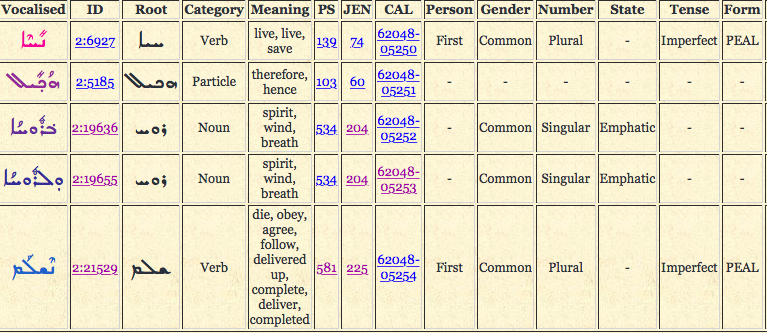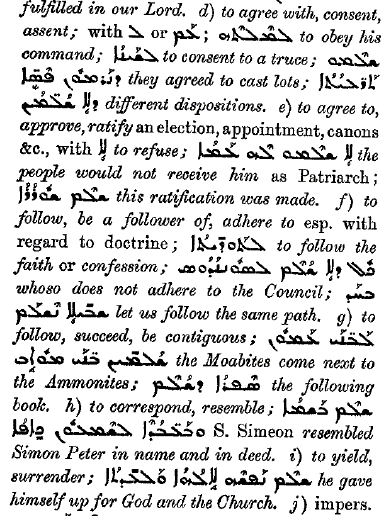This is the ninth and penultimate post in a series looking at Brian Simmons’ claims that certain verses in his so-called ‘Passion Translation’ are ‘translated from the Aramaic.’ To avoid selectivity on my part, I am examining one by one the first ten such claims in his book ‘Letters from Heaven’, which starts with Galatians. For more on my purpose and methodology see here and here.
Galatians 5.25
Εἰ ζῶμεν πνεύματι, πνεύματι καὶ στοιχῶμεν. [NA 28]
If we live by the Spirit, let us also walk by the Spirit. [ESV]
If we live by the Spirit, we must also follow the Spirit. [Lexham Bible]
(BDAG gives ‘follow the Spirit’ for this verse. Its definition of στοιχέω is ‘to be in line with a person or thing considered as standard for one’s conduct’.)
Simmons:
The exhortation of the Greek text (the subjunctive mood of στοιχῶμεν is hortatory) is lost in Simmons’ version, as is the sense of progression: if we live, then let us also keep in line. Perhaps the most distinctive feature of his rendering is the idea of surrendering and yielding to the Spirit. The Greek text does not itself contain this thought. One could argue that surrendering and yielding to the Spirit is necessary if we are to follow and stay in line with Him, but this would be a matter of interpretation, not of translation, in my opinion.
If Simmons’ claim that his rendering has been translated from the Aramaic is correct, then we should expect to find this distinctive feature in the Aramaic text. But do we?
Here is the Western UBS Peshitta text from dukrhana.com with transliteration and three English translations by Etheridge (green), Murdock (navy), and Lamsa (purple):
Although Etheridge lacks the second clause, the Syriac text does contain both clauses, as the analysis tool shows:
In its first occurrence, ܪܘܚܐ (rūḥā), ‘breath’, ‘wind’ or here, ‘spirit’ or ‘Spirit’, is preceded by a beth, the preposition ܒ (b’), meaning ‘in’; while in its second it is preceded by a waw, the copulative conjunction ܘ, meaning ‘and’, ‘also’, and by a lamadh, the preposition ܠ, meaning ‘to’ or ‘for’, which can function as the sign of either the direct or the indirect object, among other uses. The imperfect tense, used here for both verbs, and which indicates an action that is incomplete (hence im-perfect) or future, can be used (p. 62) for the jussive mood (‘let…’):
The first meaning of ܫܠܡ is ‘finish’, ‘complete’, ‘come to an end’, which does not work here, but the word can also mean ‘correspond to’, ‘agree’, ‘conform to’, as shown in Jennings:
Jennings shows further meanings in conjugations other than the simple pe’al, which is the form in Galatians 5.25. One of these is ‘yielded up’:
j. payne smith
J. Payne Smith (Mrs Margoliouth) does give the meaning ‘yield, surrender’ for the word in the pe’al form, but only as the ninth in her list (i), after the meanings ‘agree with’, ‘agree to’, ‘follow’, ‘follow after’, ‘correspond [to]’, ‘resemble’. The one example she gives of this use of the word is from a non-biblical source, and should be given less weight than usage in the Peshitta, it seems to me:
r. payne smith
Her father, R. Payne Smith, gives the meaning of ܫܠܡ in Galatians 5.25 by means (col. 4184) of the Greek word στοιχέω which it there translates. He also cites four other places in the New Testament where the word translates στοιχέω:
Romans 4.12
Notably, it is used to translate στοιχοῦντες (the participle in its masculine nominative form) in Romans 4.12:
καὶ πατέρα περιτομῆς τοῖς οὐκ ἐκ περιτομῆς μόνον ἀλλὰ καὶ τοῖς στοιχοῦσιν τοῖς ἴχνεσιν τῆς ἐν ἀκροβυστίᾳ πίστεως τοῦ πατρὸς ἡμῶν Ἀβραάμ. (NA 28)
‘and the father of circumcision to those who not only are of the circumcision, but who also follow in the steps of the faith of our father Abraham which he had while uncircumcised.’ (NASB)
where the same word can be seen in participial form as ܕ݁ܫܳܠܡܺܝܢ on the second line, fourth from right. The lexeme of the following word ܠܥܶܩܒ݂ܳܬ݂ܳܐ (ləᶜeqḇāṯā) is ܥܩܒܐ (‘e-qof-beth-alaf), means ‘heel’, ‘foot’, ‘track’. In the plural, as here, with the lamadh prefix as sign of the direct or indirect object, it can mean ‘in the footsteps’, as ἴχνεσιν does in Greek. It follows that ܫܠܡ can naturally be translated here as ‘follow in’ or ‘walk in’. It cannot mean ‘yield to’ here, which is further evidence that it does not mean ‘yield to’ in Galatians 5.25.
Brockelmann
Brockelmann includes Galatians 5.25 among the instances where ܫܠܡ means ‘secundus est’ (from ‘sequor’, ‘to follow’), and translates στοιχεῖν:
comprehensive aramaic lexicon
In the full version of the Comprehensive Aramaic Lexicon (which I have only just now realised is online), Galatians 5.25 is cited for the word in its pe’al form under the meaning ‘follow’:
The closest the CAL comes to ‘yield’, ‘surrender’ is ‘to give up, sacrifice oneself’, but this is in the aph’el form, not the pe’al:
lamsa and alexander
The lexical evidence, taken as a whole, provides no justification for assigning the meaning ‘yield to’ to ܫܠܡ. It may be that Simmons has derived his rendering of Galatians 5.25:
‘We have now chosen to live in the surrendered freedom of yielding to the Holy Spirit!’
from two English versions, those of Lamsa and Alexander:
‘Let us therefore live in the Spirit, and surrender to the Spirit.’ (Lamsa)
‘To live thus is by the Spirit and in submission to the Spirit.’ (Alexander)
From Alexander, he may have derived the absence of exhortation. From Lamsa’s ‘surrender’ and Alexander’s ‘submission’ may come Simmons’ ‘surrendered’ and ‘yielding’. The idea of freedom seems to be his own.
Andrew













One Comment